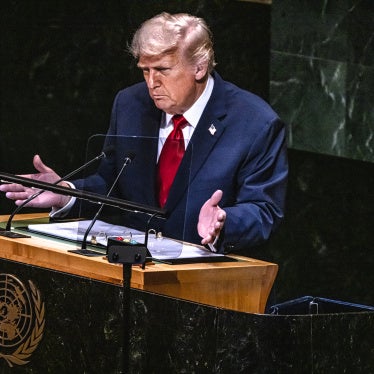The facts surrounding the gruesome murder of Jamal Khashoggi, a journalist and Post Global Opinions columnist, have continued to leak into the public view. But what has been missing is any commitment to create a path capable of delivering meaningful justice.
Turkey’s foreign minister, Mevlut Cavusoglu, took a first step on Nov. 14 when he called for an international investigation. Under the guidance of the United Nations secretary general, such an effort could get to the bottom of what really happened, determine who was responsible and ensure that they are held to account. It could run parallel to Turkey’s criminal investigation, which is already underway, and add a level of international legitimacy and independence. Furthermore, if conducted by seasoned criminal investigators, it could really dig into finding the suspected killers and murder masterminds, free from any immediate political baggage.
The Saudis have said they will investigate, but the notion that a Saudi inquiry might produce anything meaningful strains credulity, especially given Riyadh’s proven inability to investigate itself. On Wednesday, and without offering evidence, the Saudis announced that Crown Prince Mohammed bin Salman was not responsible and that they are seeking the death penalty for five suspects. Turkey, on the other hand, intends for its inquiry to be legitimate and up to international standards, but the Saudi probe is likely to be a whitewash that deflects pressure and produces a scapegoat. Authorities in Ankara have warned the Saudis against prolonging the investigation while continuing themselves to divulge bits and pieces of information about the murder to the media.
In the weeks since Khashoggi was murdered, the steady stream of disturbing and macabre allegations has presented a file of evidence so damning that even the Saudi government had to reverse its initial denials and acknowledge that he was killed. The process by which the Saudi authorities came to that begrudging announcement was full of fits and starts and, ultimately, appeared aimed not at enabling meaningful justice but at insulating the crown prince and protecting his rule. Even the emergency shuttle diplomacy by Secretary of State Mike Pompeo during those early days after Khashoggi’s disappearance was more likely geared to determine how much credibility the United States would be able to extend to the Saudis’ ludicrous narrative, rather than how to achieve justice.
President Trump has threatened “severe punishment” for anyone linked to Khashoggi’s killing, and Pompeo has pledged to hold those responsible accountable. On Thursday, the United States imposed sanctions on most of the sacrificial lambs Saudi Arabia offered up as suspects — some of whom may in fact have been involved. But for the most part, Trump’s and Pompeo’s statements belie what we already know: The Trump administration isn’t actually willing to take steps that would rattle the crown prince or undermine the “important strategic relationship between the United States and the Kingdom of Saudi Arabia.”
Consequently, the Turkish foreign minister’s call for an international investigation should lead the way if there is to be movement on the global calls for justice — and to help Khashoggi’s children understand what really happened to their father.
Importantly, there is precedent for this kind of inquiry. In 2008, Pakistan asked U.N. Secretary General António Guterres’s predecessor, Ban Ki-moon, to investigate the assassination of former prime minister Benazir Bhutto. And earlier this year, Britain turned to the Organization for the Prohibition of Chemical Weapons (OPCW) to confirm British authorities’ findings that a Soviet-made nerve agent had been deployed in Salisbury. The unequivocal message such an investigation would also send about the need to protect journalists, at a time when they are alarmingly under attack around the globe, is a vital complement.
The Trump administration’s reliance on the Saudi investigation gives Congress a valuable opening to weigh in constructively, in favor of a U.N. effort that is independent and more legitimate. Indeed, as the lame-duck session gets underway, members are preparing concrete ways to respond to Khashoggi’s killing, whether legislatively or otherwise. Twenty-two senators have also called for an investigation under the Global Magnitsky Act, which could determine whether the Saudis are responsible for extrajudicial killing, torture or other gross violations of human rights.
These are all important steps that will also help hobble the Saudi coalition’s reckless operations in Yemen, stem the carnage and begin to respond to Khashoggi’s murder. But the circumstances surrounding his death have resonated globally and brought home a level of brutality for millions of people that is usually distant and abstract. Such a heinous act not only demands answers — it also demands truth and justice.
Members on both sides of the aisle have called for accountability and promised a forthright response. Khashoggi’s children and his fiancee have called on the international community to take serious steps to reveal the truth. The Turkish foreign minister has made clear his support for an international inquiry as well. Now is the time.







